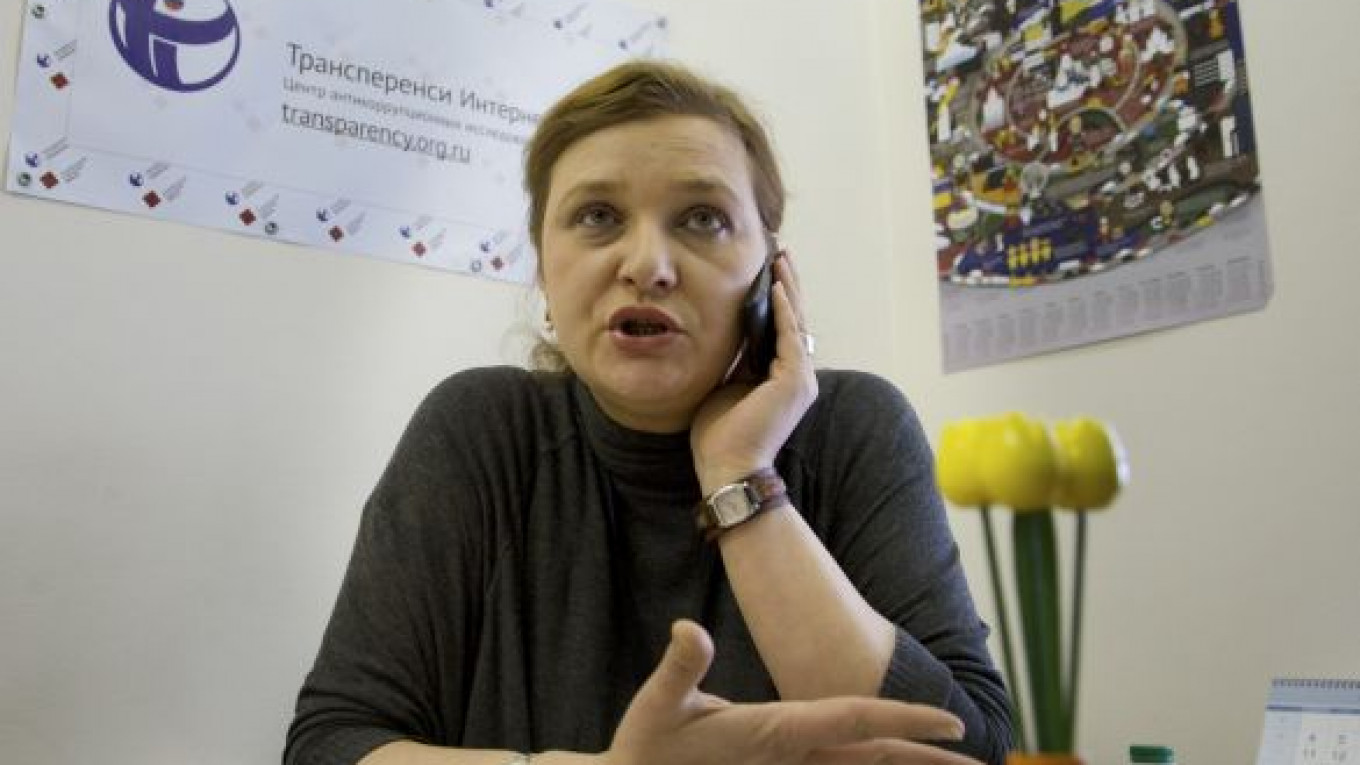Prosecutors on Wednesday continued performing unannounced inspections of nongovernmental organizations, checking the Moscow offices of three prominent groups and summoning two human rights leaders for questioning.
Officials have inspected about 2,000 NGOs nationwide in the past month, Pavel Chikov, head of the Agora human rights group, said by telephone. On Wednesday, the Moscow offices of Human Rights Watch, Transparency International Russia and the Civic Assistance Committee were inspected.
Yelena Panfilova, head of Transparency International Russia, and Svetlana Gannushkina, head of the Civic Assistance Committee, linked the checks to the recently enforced law obliging NGOs that receive funding from abroad and are involved in political activities to register as "foreign agents."
No such foreign agents have been registered since the law took effect in November, and many NGOs have publicly refused to abide by it, including 11 that complained about the law to the European Court of Human Rights.
Panfilova suggested to The Moscow Times that "there is probably a list" of NGOs that "hypothetically can turn out to be foreign agents." Authorities are checking "the most prominent and the most active organizations," she said.
On Monday, the Moscow offices of Amnesty International, Memorial and the Public Verdict Foundation were inspected. Memorial's office was also inspected last Thursday and Friday and this Tuesday.
"The regime has changed. [President Vladimir] Putin has come, and now they can behave outrageously," Gannushkina said by telephone. "We have to thank Vladimir Vladimirovich [Putin]. They hinder our work greatly."
Gannushkina said the foreign agent law was a "signal" for authorities to act "illegally" toward NGOs.
EU foreign policy chief Catherine Ashton on Tuesday issued a statement voicing concern over the checks of NGOs by authorities in Russia. She said such inspections were "conducted on vague legal grounds" and seem to be aimed at further undermining civil society in the ."
Agora's Chikov and the head of the Moscow-based For Human Rights movement, Lev Ponomaryov, have been summoned for questioning, Ekho Moskvy reported. They have called the checks illegal.
The Prosecutor General's Office on Wednesday shrugged off the accusations about illegal checks, saying they were "based on the work plan" of the agency, spokeswoman Marina Gridneva told Interfax.
Ponomaryov was summoned for his refusal to hand prosecutors some documents during an unexpected check of his Moscow office on Monday, he told .
Ponomaryov may be charged with an administrative offense over not providing the papers, .
For Human Rights provided all the documents required by law to the Justice Ministry during a routine check of its activities early this year, Ponomaryov told the radio station.
Prosecutors have asked Agora to provide information about the money it received from foreign sources in 2011 and 2012, as well as copies of documents related to the group's foundation and its activities, the names of its staff, and information about the sources of the group's property and its items of property, said Agora's online mouthpiece, Openinform.ru.
Chikov is scheduled to be questioned .
Several NGOs have filed lawsuits against the Prosecutor General's Office in connection with the surprise inspections, Ekho Moskvy Wednesday, citing Agora.
Contact the author at n.krainova@imedia.ru
A Message from The Moscow Times:
Dear readers,
We are facing unprecedented challenges. Russia's Prosecutor General's Office has designated The Moscow Times as an "undesirable" organization, criminalizing our work and putting our staff at risk of prosecution. This follows our earlier unjust labeling as a "foreign agent."
These actions are direct attempts to silence independent journalism in Russia. The authorities claim our work "discredits the decisions of the Russian leadership." We see things differently: we strive to provide accurate, unbiased reporting on Russia.
We, the journalists of The Moscow Times, refuse to be silenced. But to continue our work, we need your help.
Your support, no matter how small, makes a world of difference. If you can, please support us monthly starting from just $2. It's quick to set up, and every contribution makes a significant impact.
By supporting The Moscow Times, you're defending open, independent journalism in the face of repression. Thank you for standing with us.
Remind me later.






